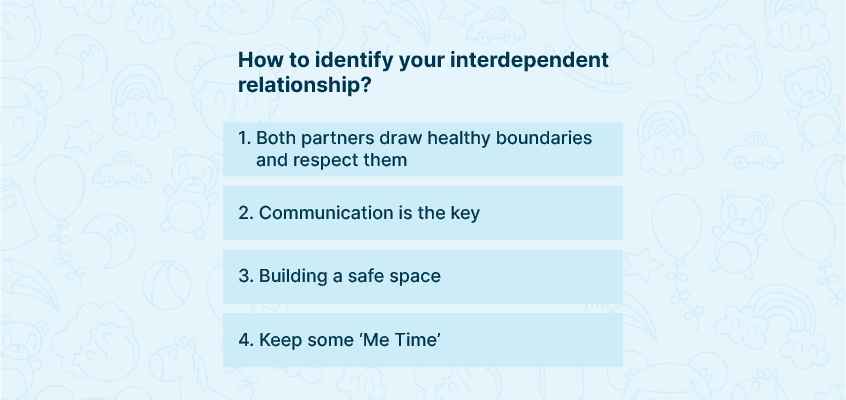Introduction
Relationships are essential for the development of humans. This connection is far more critical when it comes to romantic relationships. There may be many secrets behind building a solid and long-lasting relationship. Apart from love and trust, Interdependency is one of the essential pillars of any healthy relationship.
What is Understanding Interdependence Relationships?
Relations form the basis of the human race. They provide a loving and nurturing environment for their survival and growth. Connections also provide support and extend opportunities for an individual. When two persons are in a relationship, they form a close bonding or association. An interdependence relationship is when both the partners respect each other and cherish their emotional bond without losing their own identity in the relationship. If both the partners establish a good understanding of interdependence in a relationship, their bond becomes more solid and healthy. A relationship built on mutual interdependence lasts forever and keeps you happy.
Not many people have healthy and lasting relationships. We find many in an unhealthy relationship with significant patterns of dependency on one another. Dependent relationships are often susceptible to minor setbacks and challenges. That’s why it is essential to build an interdependent relationship.

What are the types of interdependence Relationships?
The interdependency in relationships can be of three types:
Social Interdependence:
Social Interdependence describes the integration of two or more cultures. Social interaction establishes specific goals of common interests so that one person’s activities also affect the other person in the relationship. Social interdependence can be any of the two types:
- Positive Social Interdependence: Such interdependence occurs when the two individuals in a relationship work in coordination to promote shared objectives.
- Negative Social Interdependence: Such interdependence occurs when a person in a relationship tries to obstruct the achievement of others’ objectives and vice versa.
Emotional Interdependence:
The key characteristics of any successful relationship accounts for solid emotional bonding between the two partners. Dynamic interdependence occurs when both people link together with their feelings.
Economic Interdependence:
This interdependence is when both partners participate equally in vital life decisions. Both have the independence to take up jobs of their choice and contribute to the household earnings.
What are the effects of Interdependence?
Interdependence in relations builds a solid and healthy bond. The effects of interdependency in a relationship can have a positive impact on a person’s life:
- More productivity: When two individuals are dependent on each other, they care about the other person more than themselves. Working together enhances the business and increases joint productivity.
- Better understanding: Interdependence gives the comfort of expressing your views and demands before the other person. The companion better understands the needs of their partner and works for it.
- Promotes substitutability: Being dependent in a relationship creates a substitute for one another. The actions of one person can be replaced by the other person as and when required.
- Indulgence in other activities: As the tasks are shared, each one of the partners gets time to spend time in other activities and do the wishful.
- Inducibility: Both partners are open to influencing other people. A person gets time to attend meetings and seminars and influence others, allowing expanding the business.
What are the problems of Interdependence Relationships?
At times, interdependence in relations can be vulnerable. Dependency on a person can affect the other person in many ways. These are as follows:
- Controlling mentality: Interdependence may cause dominating attitudes in people. An individual would unknowingly impose their wishes and expectations on his partner leading to problems.
- Procrastination: Due to basic human mentality, the more you are dependent on a person, the more you become complacent. One person may develop the attitude to delay things and leave it on the other person for doing every time.
- Frustration: As two people in a relationship are dependent on each other, certain behavioural traits or bad habits of one partner may irk or frustrate the other.
- Hinders personal development: Since the person is dependent on the other person for multiple things, the person becomes sluggish and unproductive, which makes a person fail to focus on their personal growth.
How to identify your interdependent relationship?
Here are some ways to characterise an interdependent relationship.
Both partners draw healthy boundaries and respect them:
Boundaries are essential in every relationship. Edges act as a navigation system in a connection, where both partners know what the limit isis the limit. Having limits is necessary to maintain your identity and space in any relationship. Creating a border makes a person responsible for their actions and affects the relationship. Many people feel having limits may be controlling, but on the contrary, healthy boundaries keep a person’s integrity and self-esteem intact.
Communication is the key:
Communication plays a crucial role in every relationship as it leaves no space for misunderstanding. Healthy communication resolves any pressing matter. People in interdependent relationships communicate with each other regularly and follow active listening. To be able to speak freely is not a one-way street. In an interdependence relationship, both partners put in equal effort to communicate and create a safe space for accessible communication.
Building a safe space:
In an interdependent relationship, partners create a safe space for each other to be vulnerable and express themselves without holding anything back. Creating this feeling of safety to express themselves freely without any fear can strengthen the bond, which helps two individuals build an authentic relationship. Safety net makes partners approachable to each other.
Keep some ‘Me Time’:
After being in a relationship, many people forget their sense of individuality. Lack of focus on personal goals and interests can be detrimental to personal growth. Couples with interdependent relationships maintain their sense of identity. One should dedicate time to the relationship as well as for himself. Everyone needs some ‘me time’ to spend some time with themselves. People in interdependent relationships enjoy ‘me time’ and feel comfortable getting back with their partners without feeling odd or guilty. They realise that they have to make time for family and friends apart from romantic relationships. They also spend time achieving personal goals such as hobbies, fitness, sports, art, music, etc.
Listening:
People in interdependent relationships value active listening. The art of active listening makes the person feel heard and valued. Fortunately, People in interdependent relationships are more likely to empathise with their partners and actively listen to things their partner shares. Active listening also encourages sharing in couples.
They say ‘no’ without being afraid:
Interdependent couples respect their partners and their sense of self. That’s why whenever they do not agree with each other, they freely say no without any fear. However, those in a dependent relationship tend to agree with their partners even if they don’t mean it. Not saying no may develop resentful feelings towards the other person.
Do not sacrifice dreams and life goals:
In a dependent relationship, partners, especially women, tend to sacrifice their wishes and life goals to please their partners. This acceptable behaviour may lead to resentful feelings. It is necessary to understand that both partners have separate professional and personal lives and goals. Couples in interdependent relationships do not give up their dreams. They find ways to grow together.
Conclusion
Interdependent relationships can be healthy and make a person feel safe. It is necessary to pay attention to the patterns in the relationship. The two individuals in a relationship should spend enough time knowing each other and set healthy boundaries to give personal space and create better understanding.









